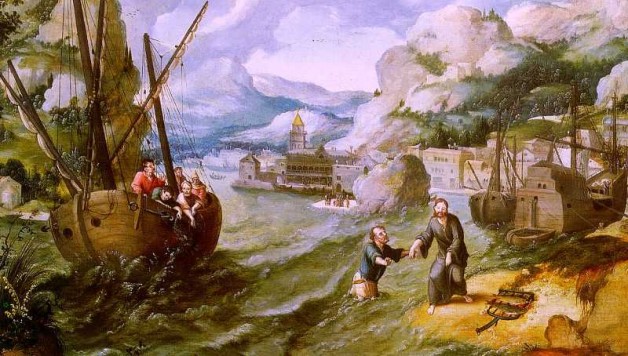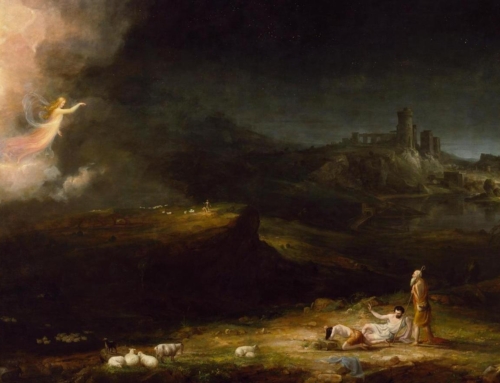Upon signing the Declaration of Independence, Benjamin Franklin urged his fellow delegates to the Continental Congress to hang together, lest they all hang separately. Without unity, there would be no chance of victory. And without victory, the Declaration of Independence would serve not as a legal compact but as a death warrant.
This understanding of unity was not lost on Abraham Lincoln, himself a pupil of the founding fathers:
“A house divided against itself cannot stand.” I believe this government cannot endure permanently half slave and half free. I do not expect the Union to be dissolved; I do not expect the house to fall; but I do expect it will cease to be divided. It will become all one thing, or all the other. Either the opponents of slavery will arrest the further spread of it…or its advocates will push it forward till it shall become alike lawful in all the States, old as well as new, North as well as South.
While many viewed secession as the most pressing concern, Lincoln feared a union enshrining slavery still more. This may seem far-fetched today, but in the year prior to Lincoln’s speech, the Supreme Court had issued a decision that rolled back many of the bulwarks which had been preventing the spread of slavery as a legal institution.
Perhaps the most odious part of the Dred Scott decision was the declaration that non-white individuals lacked American citizenship and so did not possess the legal standing to petition the Court. Compounding the moral failure with a political one, the justices ruled key provisions of the Missouri Compromise unconstitutional. While these provisions were largely a dead letter, their erasure stoked the fears of many Northerners that the right to own slaves could be declared inalienable, even in states that had not known slavery for generations. Compromise with the South seemed less and less like a tenable option.
The court was not trying to sow discord. The Chief Justice of the United States, a Catholic by the name of Roger Taney, had hoped that the ruling would end the political agitation over slavery. However, the unity imposed by the Court’s decision proved short-lived, and it has been maligned ever since. Within three years of the Dred Scott decision, Lincoln had won the presidency as the Republican candidate, and the Stars and Bars flew over the Confederacy. It would take four years of unremitting bloodshed to save the Union, proving more costly than candidate Lincoln had ever feared.
True union, as opposed to apparent unity, is not achieved easily. St. John shows this quite poignantly in the Bread of Life discourse. After the miracle of the loaves, Christ fled to avoid the crowd’s attempts to unite behind Him and crown Him king. The crowd offered Christ a merely earthly kingship more for His food than for His teaching. After sharing this earthly bread, Our Lord spoke of an immeasurably greater gift—Himself, in the Eucharist. However, unable to receive this admittedly difficult teaching, the crowds deserted Him. Eager for a political arrangement, the crowd was incapable of accepting the true sign and principle of unity—the Eucharist. Instead, they fled from the invitation.
As the crowd dispersed, Christ watched the bands He had grouped into units of hundreds and fifties melt away. But before He Himself withdrew from this disappointing day, He sought to weigh the hearts of the apostles with a question: Do you also wish to go away? (Jn 6:67)
Eleven of them remained silent, unable, or unwilling to reply. Or perhaps they conceded the answer to Simon Peter, who was designated as their leader. Echoing many other scenes throughout the Gospel accounts, it was his reply that spoke for the others: Lord, to whom shall we go? You have the words of eternal life. (Jn 6:68) At a moment of great disappointment and division, it was St. Peter’s role to strengthen his brethren by speaking for them.
St. Peter’s office remains an instrument of true unity and lasting peace through his successor, Pope Benedict XVI. One of the signs that this is really the case, and not the self-conceit of Catholics, is the constant stream of invective directed against the Pope over a myriad of issues. Like an adolescent who seeks the approval of his parents even as he dismisses their advice, the modern world constantly characterizes (and mischaracterizes) the Holy Father. And yet, for all the drama and hysterics, the Pope remains a “papa”—even to the secular world at large.
When asked about the impact of the French Revolution, Zhou Enlai (premier of Communist China) remarked that it was too soon to tell. The Popes would agree, given their role in a Body whose institutional memory spans centuries rather than decades. Over the course of twenty centuries, the Papacy has watched the world bounce from one ideology to another—and has always been there to pick up the pieces.
Like the Apostle himself, the successors of St. Peter have all too often fallen prey to sin and lapses of judgment. However, in imitation of Christ, the Papacy has been and continues to be an instrument that forges unity even in the midst of apparent discord. On this day, which marks the beginning of the Octave of Christian Unity, are we guided by St. Peter’s confession back to Christ? If not, to whom shall we go?
✠
Image: Lucas Gassel, Christ with St. Peter and the Disciples on the Sea of Galilee







